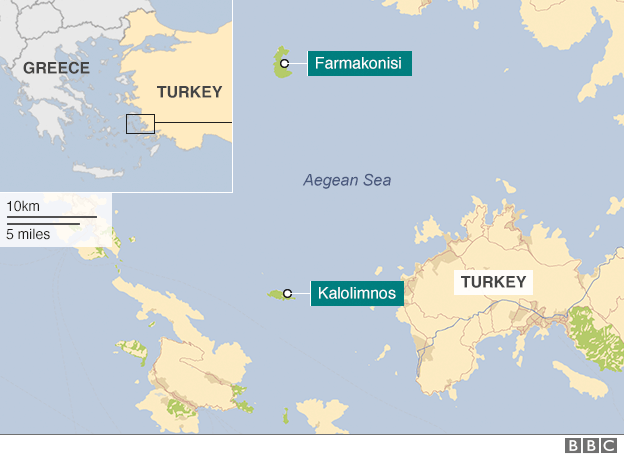Migrant crisis: Dozens drown in shipwrecks off Greece
- Published
Jenny Hill reports on "desperate scenes on Europe's shores"
At least 42 migrants have drowned overnight in two separate shipwrecks in the Aegean Sea, officials say.
The first boat struck rocks near the Greek island of Farmakonisi, while the second overturned near Kalolimnos. Many of those killed were children.
Meanwhile German Chancellor Angela Merkel said human traffickers must not be allowed to profit from exploiting people desperate to reach Europe.
More than a million migrants arrived in Europe illegally last year.
More than 700 died in the Aegean crossing from Turkey to Greece. At least another 100 have died in the Aegean this year.
'Dreadful'
After a joint cabinet meeting in Berlin, the German and Turkish leaders reaffirmed their commitment to tackling the crisis.
Mrs Merkel pledged to ensure Turkey would receive more than €3bn (£2.1bn; $3.3bn) promised by the EU in return for strengthening its border controls.
"Today, once again, we heard of dreadful numbers of dead, including children, in the Aegean," the chancellor told a joint news conference.
"We cannot let that happen, and let illegal traffickers and people smugglers be in charge between Turkey and Greece, continuing to put people in danger and profiteering."
Katya Adler: Germans struggle to cope with influx
Teaching migrants how to behave

On Thursday, French Prime Minister Manuel Valls warned that Europe's migration crisis was putting the European Union at grave risk.
Mr Valls told the BBC that Europe could not take all the refugees fleeing wars in Iraq or Syria. If it did, he said, it could "destabilise our societies".
'Population shifts'
The Greek coastguard said it had rescued 26 people from the sinking of the wooden sailboat off Kalolimnos, but that it had recovered 34 bodies - 16 women, 11 children and seven men.
It was not known how many people were on the boat, but some estimates said up to 100, and a search is continuing for more survivors.
The boat off Farmakonisi was carrying 48 people. Forty made it to shore, but six children and two women drowned, according to Reuters.
The cold and the dangers do not appear to be deterring refugees from trying to reach Europe - more than 30,000 have made such crossings to Greece already this year.
Turkey is home to nearly three million refugees, most of them from Syria.
Many of them pay smugglers thousands of dollars to make the crossing to Greece. They then head north, trying to reach Germany and Scandinavia.

Leaders back in crisis mode - by Katya Adler, BBC Europe editor
Now back in their work suits, EU politicians are clearly feeling the heat of growing public disquiet and the realisation that spring, calmer seas and the likely arrival of hundreds of thousands more migrants are just around the corner.
So this has been a week of grand political statements, which hog the headlines but actually change very little.
Manuel Valls, the French prime minister, said today that the very idea of Europe was endangered by migration, his Dutch counterpart Mark Rutte described this as a race against time, and on Wednesday Austria unilaterally declared a limit on the number of newcomers it would accept.
You'll notice it didn't say how that cap could be enforced. Austria's government is unlikely to use military might to turn asylum seekers away.

Mrs Merkel met Turkish PM Ahmet Davutoglu on Friday amid mounting pressure to rethink Germany's open-door policy and impose caps on its refugee intake.
French PM Valls appeared to suggest her current message was wrong in his interview with Lyse Doucet, the BBC's chief international correspondent.
Although he said Mrs Merkel "had courage", he added: "A message that says 'Come, you will be welcome' provokes major shifts" in population.
Lyse Doucet spoke to the French Prime Minister Manuel Valls
He added: "We know clearly that after the Cologne incidents that with the continuous flow, not only to Germany but the countries of Northern Europe, Austria, the Balkans are confronted with this influx, that's why we need to find practical solutions for our borders."
Mr Valls was referring to attacks in the German city on New Year's Eve - largely attributed to foreigners - that have sparked 800 complaints, 520 of them relating to sexual crimes.
EU countries hope Turkey will help to control the flow of migrants.
Proposals to pay Turkey for stemming the influx of migrants and refugees have reportedly stalled amid objections from Italy.
Last week Italian Finance Minister Pier Carlo Padoan said all of the funding should come from the EU budget, rather than national governments having to pay two-thirds of it.

Where Europe is failing on migrants

The 28 member states have not agreed on an EU-wide mechanism for relocating migrants, meant to ease the burden on Greece and Italy. Only small groups have been relocated so far - and several states in Central and Eastern Europe refuse to accept migrants
The Schengen agreement on freedom of movement is in jeopardy - Hungary fenced off its borders with Serbia, Croatia and Slovenia; some other Schengen countries have re-imposed border controls: Germany, Austria, Denmark, Sweden, France and Belgium
The Dublin regulation is not working effectively. Countries are no longer sending back migrants to their first point of entry to the EU
Thousands of migrants - many of them Syrian war refugees - still arrive daily from Turkey
Processing of asylum applications is slow and there is a big backlog - so reception centres are overcrowded
Germany - the main destination for migrants - is rethinking its open-door policy, partly because of outrage over assaults on women in Cologne at New Year
